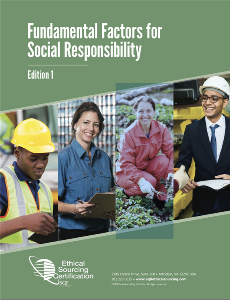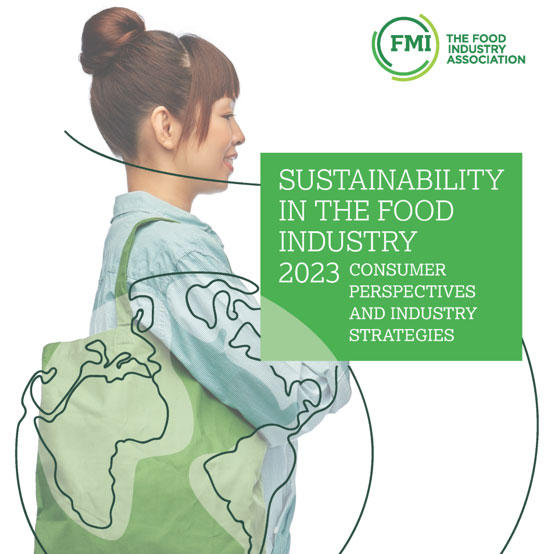By: Canaan Rice, Ethical Sourcing Manager, Safe Quality Food Institute
 In today’s “prosumer” world, consumers are placing greater pressure on suppliers and retailers to raise their standards and performance with regards to how products are made and who makes them. Product sourcing is a supply chain responsibility and the accountability rests on the shoulders of many people, companies, and governments. The Safe Quality Food Institute’s Fundamentals Factors for Social Responsibility Standard (F2SR), based off ILO (International Labor Organization) guidelines, includes provisions to mitigate against forced labor.
In today’s “prosumer” world, consumers are placing greater pressure on suppliers and retailers to raise their standards and performance with regards to how products are made and who makes them. Product sourcing is a supply chain responsibility and the accountability rests on the shoulders of many people, companies, and governments. The Safe Quality Food Institute’s Fundamentals Factors for Social Responsibility Standard (F2SR), based off ILO (International Labor Organization) guidelines, includes provisions to mitigate against forced labor.
To address the growing importance of ethical sourcing in the supply chain and meet the demand for accredited, third-party, socially responsible certification in this area, I recently came on board at SQFI to manage and grow the Ethical Sourcing certification program. As part of my exploration into ethical sourcing issues, I recently had the opportunity to talk to Matt Friedman, an international human trafficking expert and CEO of the Mekong Club, on the topic of forced labor and what role retailers and manufacturers can play in mitigating it.
Matt, what is the Mekong Club?
The Mekong Club is a non-profit organization that uses a business-to-business approach to fight forced labor. Bridging the gap between the public and private sectors, the Mekong Club helps companies to understand the complexities of forced labor and to reduce vulnerability within their supply chains. Through our corporate tools, private sector ambassadors, and awareness and advocacy efforts we have reached more than 1,000 companies, trained 50,000+ professionals, developed 17 corporate tools, and offered technical assistance to more than 600 companies.
How broad is the problem of forced labor within the supply chain?
According to the ILO, 25 million people around the world are trapped in forced labor, a significant percentage of which are associated with consumer goods supply chains. Of the 16 million victims of forced labor in the private sector, 11% are in the agriculture, forestry and fishing sector; 9% in the wholesale and trade sector, and 15% in manufacturing.
How can technology can be used to address the issue?
In collaboration with The Mekong Club, the United Nations University Institute on Computing and Society (UNU-CS) has developed a cost-effective audit tool called Apprise. This application can be downloaded to a Smartphone and used to screen vulnerable populations in the fishing and seafood processing, manufacturing and entertainment industries. Apprise allows workers to anonymously and confidentially respond to questions about their work conditions. It is currently being tested and piloted to screen migrant workers across supply chains in Asia and the Pacific region.
The Mekong Club is also working with technology companies to create blockchain-based tools for the private sector to identify and eradicate forced labor from their supply chains. The first project was launched in Thailand earlier this year and focused on working with Burmese migrants on Thai shrimp farms.
What’s the first step for responsible manufacturing in the food industry?
Conducting a risk-assessment is the first step to preventing and mitigating forced labor situations. Retailers and suppliers can:- Conduct investigative audits that illuminate the real conditions faced by workers throughout the supply chain and describe them to top-level corporate decision-makers;
- Conduct action-oriented training for staff in global corporations and their suppliers with the goal of expanding awareness and helping reduce the negative impacts of global sourcing;
- Consult at the points of maximum leverage on how to implement effective human rights protections within global businesses; and
- Facilitate multi-stakeholder initiatives that join private sector business, workers, labor, civil society, and governments to focus on both strategic and practical levels with the goal of achieving positive social change.
Join us at the 2019 SQF Conference in San Antonio, Texas, November 5-7 to hear Matt’s eye-opening keynote discussing food retail and food manufacturer liability and reputation risks; and discover proactive monitoring and auditing approaches.
We all play a role in responsible sourcing – for the good of consumers and the health of your brand.


 Industry Topics address your specific area of expertise with resources, reports, events and more.
Industry Topics address your specific area of expertise with resources, reports, events and more.
 Our Research covers consumer behavior and retail operation benchmarks so you can make informed business decisions.
Our Research covers consumer behavior and retail operation benchmarks so you can make informed business decisions.
 Events and Education including online and in-person help you advance your food retail career.
Events and Education including online and in-person help you advance your food retail career.
 Food Safety training, resources and guidance that help you create a company food safety culture.
Food Safety training, resources and guidance that help you create a company food safety culture.
 Government Affairs work — federal and state — on the latest food industry policy, regulatory and legislative issues.
Government Affairs work — federal and state — on the latest food industry policy, regulatory and legislative issues.
 Get Involved. From industry awards to newsletters and committees, these resources help you take advantage of your membership.
Get Involved. From industry awards to newsletters and committees, these resources help you take advantage of your membership.
 Best practices, guidance documents, infographics, signage and more for the food industry on the COVID-19 pandemic.
Best practices, guidance documents, infographics, signage and more for the food industry on the COVID-19 pandemic.
